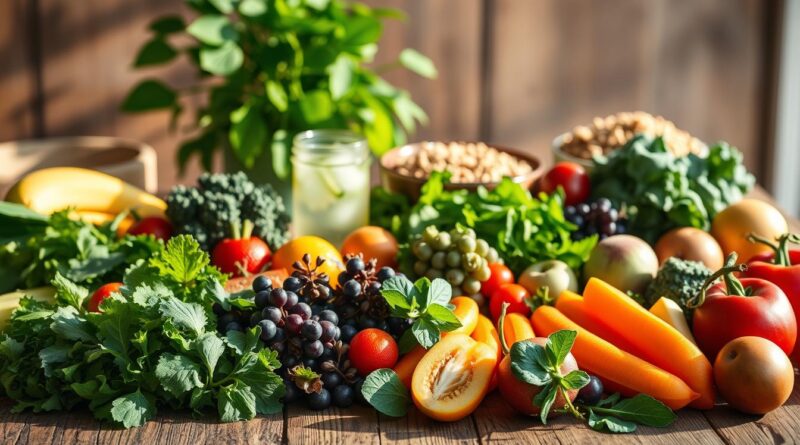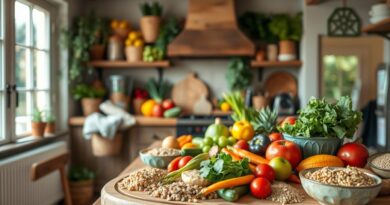Lose Weight with a Delicious Plant-Based Diet
Starting a plant-based lifestyle can change your life, especially for weight loss. Eating whole, nutrient-rich foods helps your body and helps you lose weight.
A good vegan weight loss plan is more than just avoiding animal products. It’s about enjoying the many plant-based diet benefits. These include better heart health and more energy.
Eating more fruits, vegetables, and whole grains can show you the plant-based diet benefits. This way of eating not only helps with weight loss but also boosts your overall health.
Key Takeaways
- A plant-based diet can be an effective way to achieve weight loss.
- Vegan weight loss strategies focus on whole, nutrient-rich foods.
- Plant-based diet benefits extend beyond weight loss to overall health.
- Incorporating more fruits and vegetables can support weight loss.
- A well-planned plant-based diet promotes overall well-being.
The Power of Plants for Weight Management
Switching to whole, plant-based foods can change your weight loss game. These foods are packed with nutrients, fiber, and antioxidants. They’re key for health and help with losing weight.
Why Plant-Based Eating Supports Weight Loss
Plant-based foods are great for losing weight. They have fewer calories but more fiber and nutrients. This makes you feel full and satisfied. Plus, they help control blood sugar and boost metabolism.
Key benefits of plant-based eating for weight loss include:
- Lower calorie density
- Higher fiber content
- Improved nutrient intake
- Better blood sugar regulation
Debunking Common Myths About Plant-Based Diets
Many myths surround plant-based diets, but they’re not true. One myth is that these diets lack protein. But, it’s easy to get enough protein from plants like beans, lentils, and tofu.
Here’s a comparison of common myths and realities about plant-based diets:
| Myth | Reality |
|---|---|
| Plant-based diets are protein-deficient | Plant-based sources like beans, lentils, and tofu are high in protein |
| Plant-based diets are boring | Plant-based diets offer a wide variety of flavors and cuisines |
| Plant-based diets are expensive | Plant-based staples like beans, grains, and vegetables can be cost-effective |
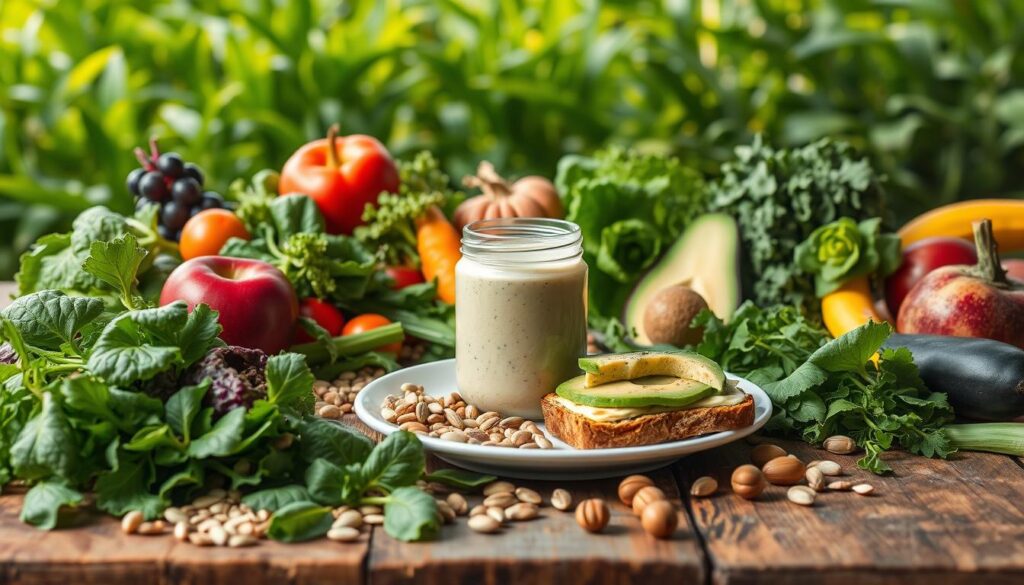
Knowing the truth about plant-based eating helps you make better diet choices. This way, you can reach your weight loss goals.
The Science Behind Plant-Based Diet for Weight Loss
A plant-based diet is great for losing weight because of its science. It focuses on foods that are low in calories but full of nutrients. This makes it easier to stay at a healthy weight.
Calorie Density vs. Nutrient Density
The key to a plant-based diet’s success is understanding calorie and nutrient density. Foods like fruits and veggies are full of nutrients but low in calories. They help you feel full without eating too many calories. On the other hand, foods high in calories but low in nutrients can make you gain weight.
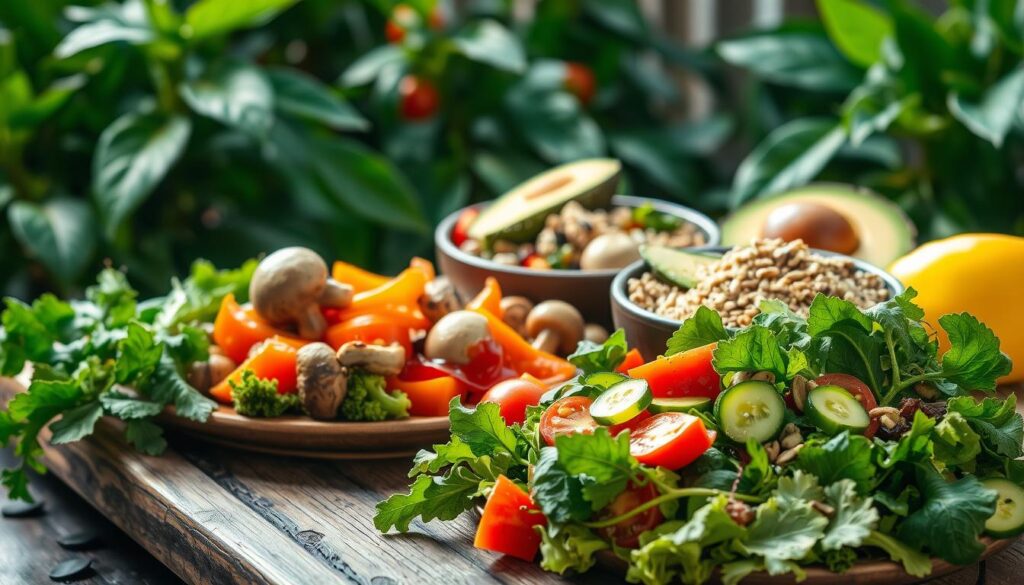
| Food Type | Calorie Density | Nutrient Density |
|---|---|---|
| Fruits and Vegetables | Low | High |
| Whole Grains | Medium | High |
| Processed Snacks | High | Low |
Fiber: Your Secret Weight Loss Weapon
Fiber is a big help in managing weight. Foods high in fiber, like those in plant-based diets, make you feel full. This helps prevent overeating. Fiber also helps with digestion and keeps blood sugar levels steady.
How Plant Foods Regulate Hormones
Plant-based foods can affect hormone levels, which is important for weight control. They contain nutrients that help balance hormones that control hunger and fullness. This makes it easier to keep a healthy weight.
Understanding these scientific principles helps see how a plant-based diet aids in weight loss and overall health.
Health Benefits Beyond Shedding Pounds
Switching to a plant-based diet brings many health perks beyond just losing weight. It can greatly improve your overall health and happiness.
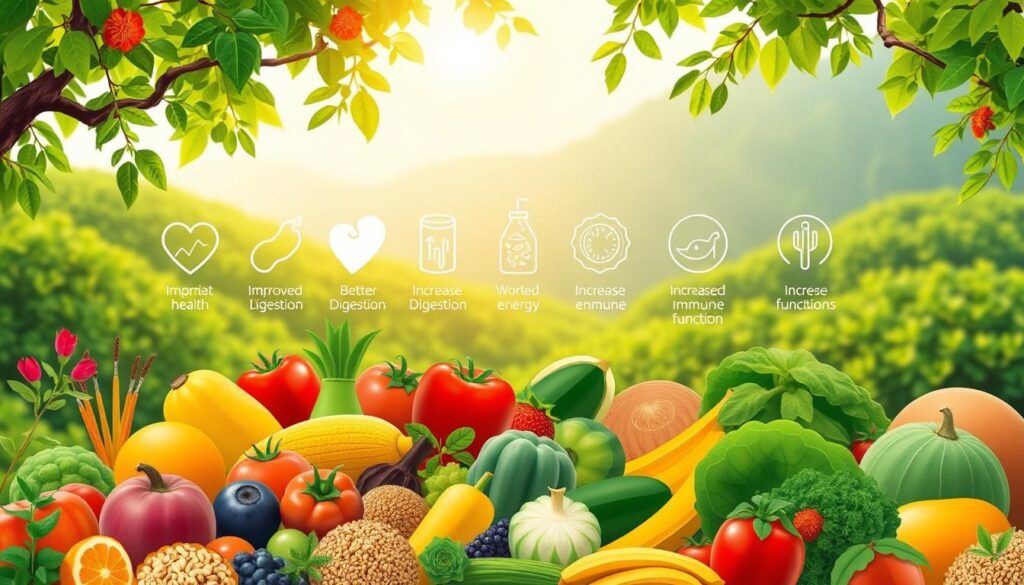
Reduced Inflammation and Chronic Disease Risk
Plant-based diets are full of antioxidants and anti-inflammatory compounds. These help lower body inflammation. This can reduce the risk of heart disease, diabetes, and some cancers.
By eating a variety of plant-based foods, you can greatly boost your health.
Improved Heart Health Markers
Plant-based eating is good for your heart. It lowers bad fats and increases fiber, helping keep cholesterol and blood pressure in check. This diet supports vegan weight loss and vegetarian weight loss while improving heart health.
Enhanced Energy and Mental Clarity
Eating plant-based foods can give you more energy and clearer thinking. These foods are packed with nutrients that help your body work well. They also reduce tiredness.
The complex carbs in whole plant foods give you energy all day long.
Choosing a plant-based lifestyle can lead to a better life and overall well-being.
Getting Started: Transitioning to Plant-Based Eating
Starting a plant-based lifestyle is a journey with simple steps. It’s not just about changing your diet. It’s about living healthier, more sustainably, and with more compassion.
Gradual vs. Immediate Approach
People often wonder if to go slow or fast when starting a plant-based diet. A gradual transition helps you adjust slowly. An immediate switch works well for those who are very motivated or have health goals. Pick what fits your life and taste.
Building Your Plant-Based Pantry
A good pantry is key to a successful plant-based meal plan. It makes sure you have what you need for tasty, healthy meals.
Essential Staples
Nuts and seeds like almonds and chia seeds are full of healthy fats and protein. Whole grains such as quinoa and brown rice give you energy. Canned beans and legumes are packed with nutrients. And don’t forget spices and herbs to flavor your food.
Time-Saving Convenience Foods
For quick meals, keep canned tomatoes, frozen vegetables, and plant-based protein sources like tofu or tempeh handy. They make fast, healthy meals easy.
| Pantry Staple | Nutritional Benefits | Culinary Uses |
|---|---|---|
| Nuts and Seeds | Rich in healthy fats and protein | Snacking, salads, baking |
| Whole Grains | Sustained energy, fiber | Main courses, side dishes, breakfast bowls |
| Canned Beans and Legumes | High in protein, fiber | Soups, stews, salads, main courses |
Kitchen Tools That Make Plant-Based Cooking Easier
The right kitchen tools make cooking plant-based easier. A high-speed blender is great for smoothies and soups. A food processor helps with prep. A slow cooker is perfect for beans, grains, and stews. And a good chef’s knife and cutting board are essential for prep.

Creating a Balanced Plant-Based Meal Plan
Creating a plant-based meal plan can change your life if you want to lose weight and feel better. A good meal plan makes sure you get all the nutrients you need. This helps you on your weight loss journey.
Plant Protein Sources for Satiety
Plant proteins are key for feeling full and keeping muscles strong. Eat foods like legumes (lentils, chickpeas, black beans), tofu, tempeh, and seitan. Nuts and seeds, like almonds and chia seeds, are also great for protein.
Healthy Fats That Support Weight Loss
Healthy fats are important in a plant-based diet. Avocados, olive oil, and nuts have monounsaturated fats. These fats are good for your heart and help you feel full. Add them to your meals for extra flavor and nutrition.
Complex Carbohydrates for Sustained Energy
Complex carbs give you energy that lasts and add fiber. Choose whole grains like quinoa, brown rice, and whole wheat. Also, eat starchy veggies like sweet potatoes and corn.
Sample 7-Day Meal Plan
Here’s a 7-day meal plan to start your plant-based weight loss journey:
| Day | Breakfast | Lunch | Dinner |
|---|---|---|---|
| Monday | Oatmeal with fruits and nuts | Quinoa salad with chickpeas and avocado | Lentil soup with whole grain bread |
| Tuesday | Tofu scramble with spinach | Grilled vegetable wrap with hummus | Stuffed bell peppers with quinoa and black beans |
| Wednesday | Smoothie bowl with banana and almond milk | Chickpea and avocado salad | Vegan stir-fry with tofu and brown rice |
| Thursday | Whole grain toast with almond butter and banana slices | Black bean and corn salad with whole grain tortilla chips | Lentil curry with brown rice |
| Friday | Chia seed pudding with coconut milk and berries | Quinoa and black bean bowl with roasted vegetables | Vegan chili with whole grain cornbread |
| Saturday | Avocado toast on whole grain bread with cherry tomatoes | Grilled tofu with roasted vegetables and quinoa | Stuffed zucchini boats with lentil and rice mixture |
| Sunday | Whole grain pancakes with maple syrup and mixed berries | Lentil and vegetable stew with whole grain bread | Quinoa and black bean salad with grilled tofu |
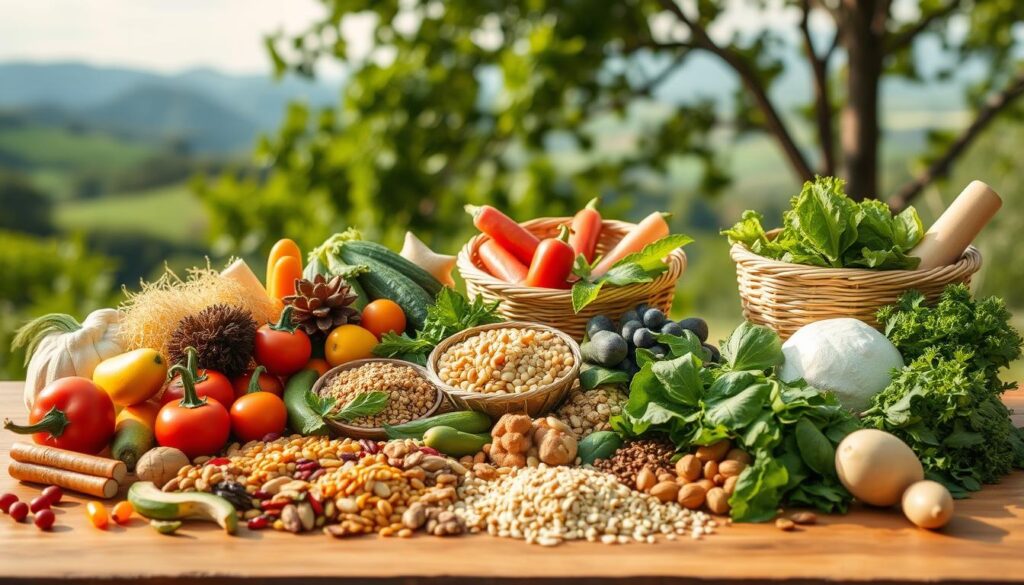
Delicious Plant-Based Recipes That Support Weight Loss
Make your weight loss journey tasty and healthy with plant-based recipes. A well-planned plant-based diet helps with weight loss and boosts health. Enjoy a variety of plant-based foods for meals that are both tasty and good for you.
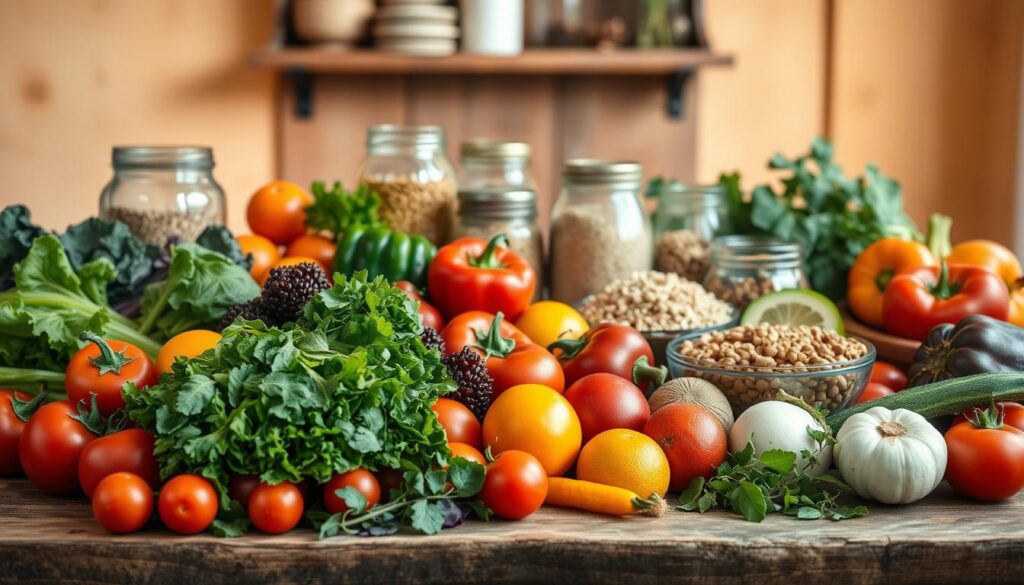
Quick and Easy Breakfast Ideas
Starting your day with a healthy breakfast is key for weight loss. Try overnight oats with fruit or a green smoothie bowl for a nutritious start. These breakfasts are quick to make and full of fiber and nutrients.
Satisfying Lunch and Dinner Options
For lunch and dinner, choose hearty salads, lentil soups, or quinoa bowls with roasted veggies. These meals are full of protein, carbs, and healthy fats. They’re very filling. Eating a variety of colors on your plate means you get lots of nutrients.
Smart Snacks and Treats
Snacking is important for weight loss. Pick raw veggies with hummus, fresh fruit, or almonds for healthy snacks. For treats, make dark chocolate-dipped fruit or baked apple chips for a sweet treat without feeling guilty.
Meal Prep Strategies for Busy Weeks
Meal prep is a lifesaver for busy weeks. Spend a bit of time on the weekend preparing meals for the next few days. Cook in bulk, portion out meals, and store them in containers for easy access. This keeps you on track with your weight loss goals, even on the busiest days.
Common Challenges and How to Overcome Them
Starting a plant-based diet for weight loss can face some hurdles. But, with the right tips, you can overcome them. A good plan is key to your success.
Navigating Social Situations and Dining Out
Dining out and social events can be tough on a plant-based diet. Here’s how to handle it:
- Look up the restaurant’s menu online to find plant-based choices.
- Eat something before going to avoid temptation.
- Tell the host or server about your diet politely.
Dealing with Cravings and Food Transitions
Cravings happen when you change your diet. Here’s how to deal with them:
- Drink water to see if you’re really hungry or thirsty.
- Find plant-based versions of your favorite foods.
- Exercise to help reduce cravings.
Getting Support from Family and Friends
Having people support you can really help. Here’s how to get that support:
- Tell your family and friends why you’re going plant-based.
- Invite them to eat plant-based meals with you.
- Look for online or local groups for more support.
Avoiding Nutritional Pitfalls
A plant-based diet can be full of nutrients if planned right. Here are some important nutrients to consider:
| Nutrient | Plant-Based Sources |
|---|---|
| Protein | Legumes, tofu, tempeh, seitan, nuts, and seeds. |
| Vitamin B12 | Fortified plant milk, nutritional yeast, cereals. |
| Iron | Legumes, dark leafy greens, fortified cereals, nuts, and seeds. |
Knowing these challenges and how to beat them can help you reach your weight loss goals. A plant-based diet can be very effective.
Success Stories: Real People Who Lost Weight with Plant-Based Eating
Many people have changed their lives by choosing a plant-based diet for weight loss. It’s not just about losing weight. It’s about living healthier and more sustainably.
Transformations from American Plant-Based Dieters
Many Americans have lost a lot of weight by eating plant-based. Sarah, a 35-year-old mom, lost 50 pounds in six months. She focused on whole foods and plant-based meals. Her journey improved her health and energy.
John, a 42-year-old office worker, lost 70 pounds in a year. He followed a vegan weight loss plan. He added plant-based proteins and healthy fats to his diet. This kept him full and satisfied.
| Name | Weight Loss | Time Frame |
|---|---|---|
| Sarah | 50 pounds | 6 months |
| John | 70 pounds | 1 year |
| Emily | 30 pounds | 4 months |
Lessons Learned from Long-Term Success
Consistency and patience are key to losing weight on a plant-based diet. It’s a long-term commitment to lifestyle changes.
It’s also important to eat a variety of foods. Including different colored vegetables, proteins, and fats keeps the diet interesting and balanced.
Conclusion: Embracing a Plant-Based Lifestyle for Sustainable Weight Loss
Starting a plant-based diet is a great way to lose weight and get healthier. It focuses on eating whole, nutrient-rich foods. This can help manage weight, lower inflammation, and boost energy.
To lose weight with plants, make a balanced meal plan. Include different plant proteins, healthy fats, and complex carbs. This way, you get full, tasty meals that help you reach your weight loss goals.
A well-thought-out plant-based meal plan does more than help with weight. It also boosts overall health and lowers the risk of chronic diseases. As we’ve seen, a plant-based life has many benefits, like better heart health and clearer thinking.
Choosing a plant-based lifestyle can lead to lasting weight loss and better health. Begin by adding more plant-based meals to your diet. See how a plant-based life can change you for the better.

